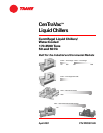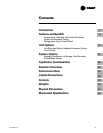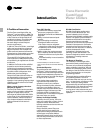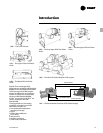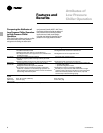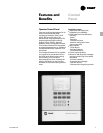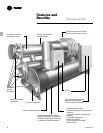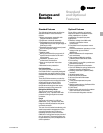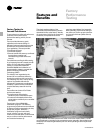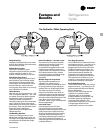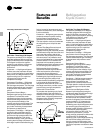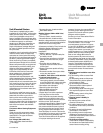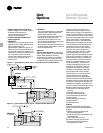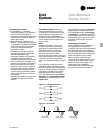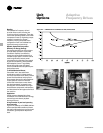
CTV-PRC007-EN©American Standard Inc. 2001
What We Mean By Earth•Wise
Breaking the .48 kW/Ton
Efficiency Barrier
The Trane Earth
•
Wise CenTraVac has a
proven track record as literally the
world’s most efficient, lowest emissions
chiller. In fact, a portion of the product
line is selectable at an unmatched
efficiency level of .48 kW/ton, at standard
ARI rated conditions. This is an efficiency
level of 16 to 25 percent better than
competitive chillers using other
alternative refrigerants, which are
typically in the .56 to .60 kW/ton range.
On a 1000-ton chiller, this efficiency
difference can provide savings of over
$24,000 per year or nearly three quarters
of a million dollars over the life of the
machine . . . typically more than twice
the initial cost of the machine. And, at
part-load conditions, the kW/ton ratings
are even better; a fact that can be seen
by comparing Trane’s ARI certified
applied part load values (NPLV’s) to
those of competitive units.
The development of the .48 kW/ton
chiller also has a positive environmental
impact. Consider this:
If every centrifugal chiller in the world
were able to operate at .48 vs .56 kW/ton,
utility generated greenhouse gas
emissions could be reduced annually by
nearly 17 billion pounds of CO
2
while
SO
2
and NO
x
could be reduced by over
64 and 27 billion grams, respectively.
This reduction is equivalent to removing
more than two million cars from the
road or to planting nearly 500 million
trees each year.
Lowest Total Refrigerant
Emissions In The Industry
Furthermore, the Trane “near zero”
emissions Earth
•
Wise chiller also has
the lowest total refrigerant emissions in
the industry. So low that it’s essentially
a closed system.
The key to the industry’s highest energy
efficiency and lowest leak rate is the
use of a low pressure refrigerant
DuPont calls SUVA-123; a refrigerant
that has the lowest direct-effect global
warming potential and the highest
thermodynamic efficiency of all non-
CFC refrigerants; a refrigerant in use in
more new centrifugals today than all
other alternatives combined.
Balancing Our Accountability
for Ozone Depletion, Global
Warming and Energy
Efficiency
Reduced power plant emissions and
the industry’s lowest refrigerant
emission rate put the Trane .48 kW/ton
Earth
•
Wise centrifugal chiller in a class
by itself, from both a business and an
environmental standpoint. The future
lies in the prudent balance that takes
into account the importance of ozone
depletion, global warming and energy
efficiency. A balance that is right for
both business and the environment.
Introduction
World’s Most
Efficient Lowest
Emissions Chiller
Built For The Industrial Market
•
Direct drive for reliability
•
Multi-stage compressor for efficiency.
•
“Near Zero” refrigerant emission
design.
•
Evaporator and condenser designed to
maximize efficiency and reduce
operating costs.
•
Proven shell and tube design offering a
variety of high performance heat
transfer surfaces.
•
Evaporator, condenser and
compressor combinations allow
selection of a chiller that best meets
the system requirements.
•
Options like heat recovery, free
cooling, auxiliary condensers, ice
storage and a unit-mounted starter for
expanded capability and maximum
efficiency.
•
Complete factory assembly of the
CenTraVac
™
options for reduced jobsite
assembly labor and expense.
•
Machines designed for operating with
environmentally acceptable HCFC-123.
•
Trane patented fixed orifice system for
ensuring proper refrigerant flow at all
load conditions. This eliminates the
need for other moving parts such as
float valves, expansion valves.
•
Low speed direct drive capability offers
up to 5 percent more energy efficiency,
at full load, than gear drive chillers.
Also, low speed direct-drive operation
improves reliability and maintenance
costs are also lower.
•
CenTraVac control panel
•
Adaptive Control
™
•
Microprocessor based
•
Complete operating status and
diagnostics display.
•
Interfaces with building management
system.
•
High efficiency Purifier
™
Purge works
as an early warning leak detector that
also takes purge refrigerant emissions
to an industry low.



